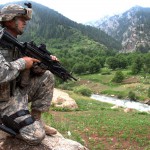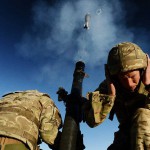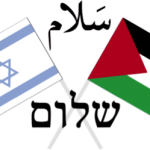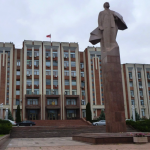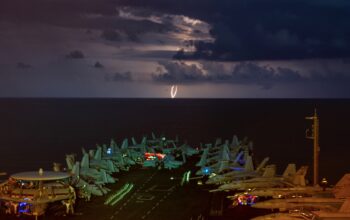The very first time I heard about the Right to Movement Palestine Marathon was with a little bit of sadness. The very first marathon had just happened and I missed it, this was about a year ago. However, as a student of International Relations, passionate about foreign affair and an avid runner, I knew I could not let the second one pass without being part of it.
The Israeli-Palestine conflict is one of the most important events of the second half of the 20th century and continues to be unresolved in the first decades of the 21st century. It’s a source of violence in the Middle East that spreads its consequences throughout the near region and the world. These consequences come in the form of refugees and terrorist acts that shape the foreign relations of the biggest economy and most powerful military in the planet… the United States. Therefore, for anyone involved in foreign affairs, this struggle is a great source of interest. At the same time, it is such a complex situation that it is really difficult even for the most knowledgeable ones to give an opinion without seeming biased. However, there is a clear power difference in this fight between the parties and it resembles to David against Goliath. In this case, David wouldn’t represent the king of Israel but the Palestinians who are much weaker economically and militarily in comparison to Israel. This is my motivation to run. Although I can’t give a solution and point fingers in such a complex issue, I know Palestinians have an uphill battle to achieve their rights and that’s the reason why they need the help of the international community since they can’t couple with this struggle on their own.
The same desire to help was the reason why a group of Danish runners and activists together with local Palestinians in Bethlehem created an organisation called The Right to Movement. This institution is responsible for the creation of the Palestine Marathon which first happened in 2013. Their pledge is to create awareness about the restrictions on movement that Palestinians endure in their everyday life. According to their website, “Palestinians cannot move freely on roads or from one city to another. The Palestinians right to move is controlled by their ID, permits, which city they live in, or who they are married to. The environment that Palestinians were supposed to move freely in is occupied and thus controlled by a foreign army. An army that controls their movement with roadblocks, checkpoints, military zones, an illegal wall and a complex set of discriminatory laws”.
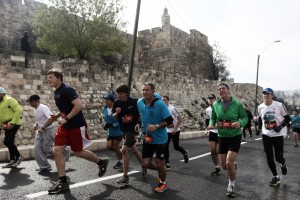 This restriction on Palestinian’s right to movement is highlighted by the fact that the race organisation had problems finding the necessary 42.192 kilometres stretch of roads necessary for an official Marathon without reaching a wall or checkpoint. To solve this problem the full marathon race was performed doing two laps on a shorter distance. This issue highlights the point of the whole event, to show that Palestinians don’t have one of the basic rights stipulated in the United Nations Human Rights declaration. The right is enshrined in Article 13 which stipulates that “everyone has the right to freedom of movement”.
This restriction on Palestinian’s right to movement is highlighted by the fact that the race organisation had problems finding the necessary 42.192 kilometres stretch of roads necessary for an official Marathon without reaching a wall or checkpoint. To solve this problem the full marathon race was performed doing two laps on a shorter distance. This issue highlights the point of the whole event, to show that Palestinians don’t have one of the basic rights stipulated in the United Nations Human Rights declaration. The right is enshrined in Article 13 which stipulates that “everyone has the right to freedom of movement”.
The race took place in Bethlehem, the birth place of Jesus. It started in front of the Church of Nativity, where Christians believe the physical location where Christ was born, adding to the grandiosity of the event. The first kilometres are run next to the Wall which by many Israelis is referred to as the “separation barrier” and by many Palestinians as “apartheid wall.” In 2004, the International Court of Justice deemed the Wall illegal as it is not build on the 1967 border, the so-called Green Line, but instead is built inside the Palestinian territories thus separating Palestinians from Palestinians and Palestinians from their land. Palestinians need permits to cross the wall through military check points whereas Israelis can move freely from one side to the other. The Palestinian side of the Wall has graffiti that symbolises their struggle.
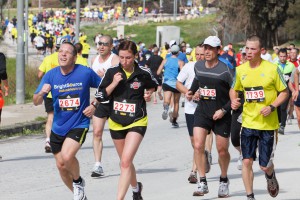 After a few kilometres and alongside the wall we ran through the Palestinian refugee camp of Al Ayda, where the entrance is marked by a huge key. This key symbolises the actual keys from the houses where many Palestinian used to live before being expelled during the creation of Israel. Even today, some keep the original keys as a wish to return to their original land. Runners go through a second refugee camp, Ad Dheisheh, which has 13,000 registered inhabitants, a third of them unemployed. The result is a view of poverty and a life of difficulties.
After a few kilometres and alongside the wall we ran through the Palestinian refugee camp of Al Ayda, where the entrance is marked by a huge key. This key symbolises the actual keys from the houses where many Palestinian used to live before being expelled during the creation of Israel. Even today, some keep the original keys as a wish to return to their original land. Runners go through a second refugee camp, Ad Dheisheh, which has 13,000 registered inhabitants, a third of them unemployed. The result is a view of poverty and a life of difficulties.
Besides some foreign faces, the great majority were local runners. The total number of athletes added up to more than 2,500 from 38 different countries, which is quite a respectable number since this is only the second year of this event and the travel conditions and security concerns (which were non-existent) can drive off many competitors. Of those runners, 35% were female, which is also respectable considering the circumstances.
Running in a majority Muslim region has its particularities. What surprised me the most was the beautiful prayers coming out of the local mosques. Personally, it gave me a quite relaxing feeling which is not common for someone who is preparing to run for more than 3 hours straight. Aside from that, clothing precautions have to be taken in regards to female runners. Although few wore the full head-covering, nearly all (including the foreigners) had to cover their knees as well as shoulders. All of these safeguards added to the difficulties of running a Marathon since the weather was really hot which apparently didn’t change the local boys culture of also running with long pants, even though we were not instructed to do so.
According to the organisation, the race was a great success and another one will follow next year, in an attempt to make of it an annual event. This will fulfil the organisers’ wishes, that like any other country, Palestine should also have the right to host its own Marathon.
By Rodrigo de Souza
Image credit:
Picture 1: israeltourism, licensed under CC BY 2.0
Picture 2: Brian Negin, licensed under CC BY-NC-ND 2.0

